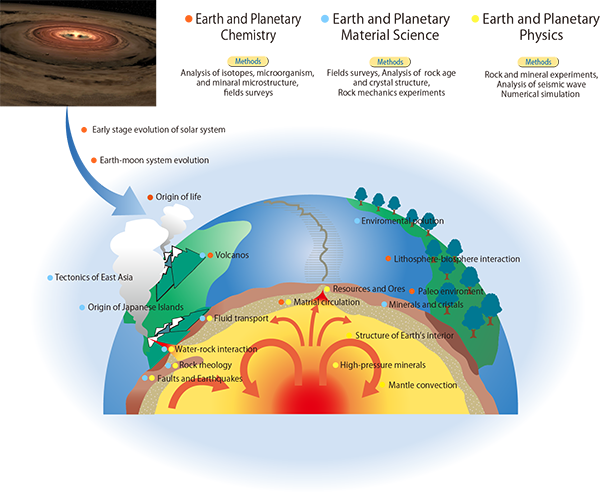Learn about the Earth! Learn from the Earth!
Earth, the third planet in the solar system, is still active. Natural phenomena (such as earthquakes, crustal movements, environmental changes, volcanic activity, mantle convection, and celestial collisions) occur on various time and spatial scales on its surface and in the universe beyond, and these can be viewed as systems in which various physical, chemical, and biological processes are intricately intertwined.
In this department and program, we conduct research and education with the aim of clarifying the past and present of the Earth and predicting its future by fundamentally understanding these natural phenomena.
Specifically, the three research groups shown in the figure below work together to conduct cutting-edge research in a wide range of fields in Earth and planetary science, including the evolution of the solar system, the origin of life, the birth and evolution of the Earth, the dynamics of the Earth, exploration of the Earth’s internal structure, changes in the Earth’s environment, and natural disasters. Based on the results of these research, all faculty members provide education to all students (“All to All” education). The characteristics of education in the department and program (graduate school) are as follows.

Department of Earth and Planetary Systems Science
The curriculum is systematically organized from basic subjects to specialized subjects, so it is okay if you have not studied earth science in high school. In the fourth year, students can engage in cutting-edge research on themes that interest them.
■ Expert knowledge, methods, and analytical skills in earth and planetary science
In the lower grades, basic and broad content is provided, and in the upper grades, specialized content is provided. By increasing the level of content as the grades progress, we aim to develop students with extensive expert knowledge, methods, and analytical skills in earth and planetary science.
■ Education according to student characteristics
In the upper grades, in order to make use of each student’s interests and areas of expertise, we provide education according to each student’s individual characteristics by allowing them to choose from multiple courses of lectures, experiments, practical training, and seminars.
Earth and Planetary Systems Science Program
This program is equipped with excellent research facilities and human resources to conduct cutting-edge research. Students can receive research guidance in a wide range of fields, including field surveys, experiments, analysis, and computer simulations, depending on their interests. In addition, by encouraging students to work on collaborative research with researchers both in Japan and abroad and to take on interdisciplinary research, we aim to develop human resources with a wide range of knowledge and an international perspective.
■ Research and education in a wide range of fields
In the diverse research fields of earth and planetary science, we will provide guidance to deepen understanding of different fields and to position students’ own research themes within a broad perspective.
■ Research presentation training and improvement of international perspective
We provide training on how to summarize and present the research, and by listening to research presentations in English by international students and foreign researchers enrolled in this program, we will improve the international perspective of Japanese students.
■ Acquisition of knowledge and methods related to earth and planetary science
We will grow students who have acquired advanced specialized knowledge and specialized methods in earth and planetary science and have deep insight.
